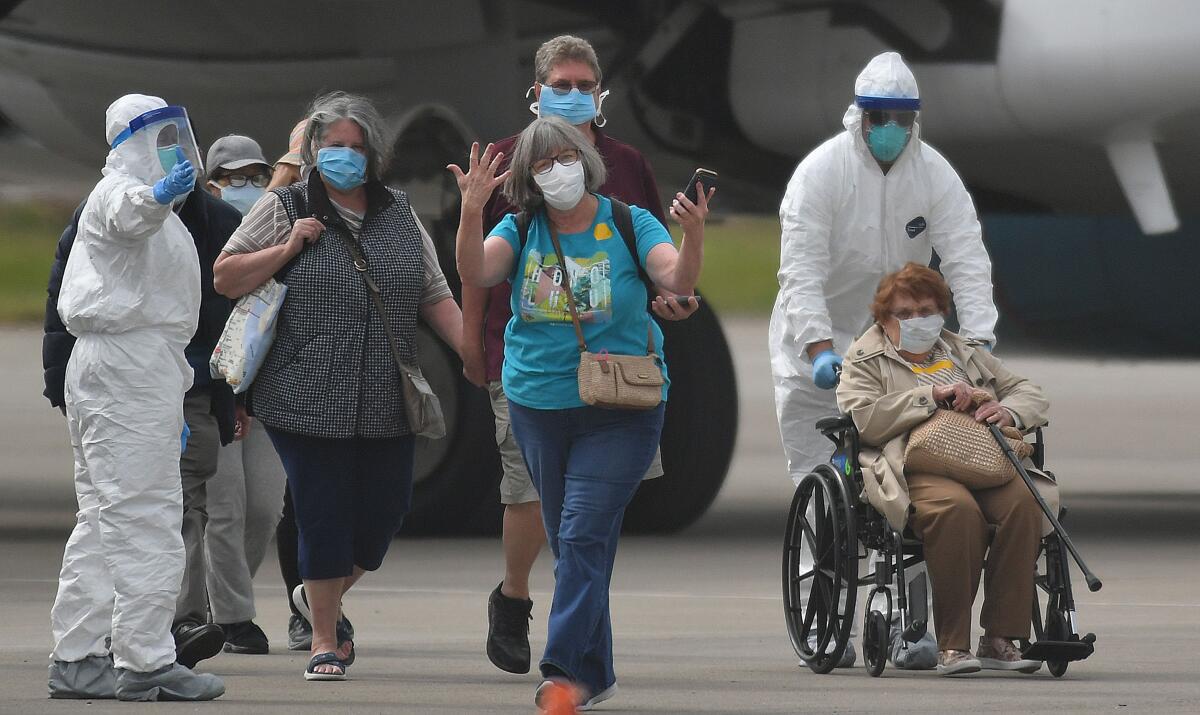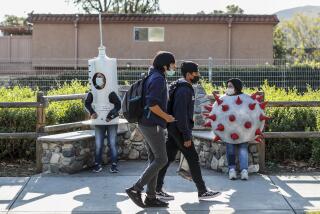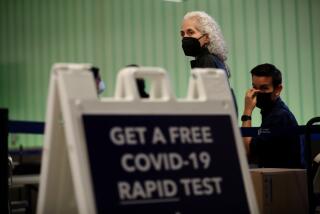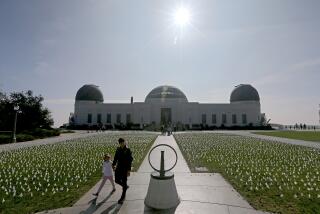California has 157 coronavirus cases, but thousands may have been exposed to disease

- Share via
SACRAMENTO — Gov. Gavin Newsom said Tuesday that California has 157 confirmed cases of COVID-19 and that thousands of residents may have come into contact with the disease.
The governor said more than 1,075 Californians have been tested for the coronavirus at 18 labs across the state. The state is monitoring another 10,300 individuals that returned to California on international flights and may have been exposed, he said. Many others who have interacted with infected people are being advised to self-monitor and quarantine at home.
The state marked a turning point in its fight against the virus in recent days, with counties all over California shifting from aggressively tracking residents who may have come into contact with infected people to recommending “social distancing” measures, such as avoiding large groups.
Public health experts say counties make that shift as cases increase, and it becomes increasingly difficult to track infections and quarantine thousands of potential contacts. Instead, counties focus on slowing the spread among large groups and direct resources to protecting nursing homes, hospitals and other at-risk facilities.
A woman in her 90s has died of the novel coronavirus in a northern California assisted-living complex, sparking fears of an outbreak among other residents of the facility.
California relies heavily on county public health officers to make decisions for their local community — a practiceNewsom defended on Tuesday.
“We’re a nation-state,” Newsom said. “This is not a small, isolated state. The state of California is 40 million strong, 58 counties. So, what we’re doing is a bottom-up process, not a top-down process. We’re providing guidance in concert, in collaboration with the federal government and we are sending that down … but each and every county is experiencing a different set of circumstances on the ground.”
The state issued guidelines over the weekend encouraging local schools with one or more confirmed cases of COVID-19 to close campuses. Schools without any cases were advised to prepare for potential closures and to send home students and staff who have visited countries with travel health notices in the last two weeks, or who show signs of fever or respiratory infection.
State officials have similarly asked colleges to isolate or send home staff and students who have visited the same countries, or presented symptoms of the disease.
Universities with confirmed cases are advised to weigh the need to close campuses. Officials are also requesting that organizers prepare to cancel any large-scale events in communities where the virus is spreading.
But even before the state’s new guidelines were released, colleges had begun canceling in-person classes, schools had been shuttered, workplaces had sent home sick or potentially infected employees, and travelers had canceled flight plans — actions that will have ripple effects on the local and state economy.
As the stock market reacted to widespread concerns about a pandemic, federal officials warned Monday that individuals older than 60 are at the greatest risk of serious complication from the virus and said the average age of death is 80. The Trump administration said that children and young adults are more likely to die from the standard flu than COVID-19.
Dr. Sonia Angell, director of the California Department of Public Health, advised residents who know they have come into contact with people who tested positive for COVOID-19 to continue to self-quarantine for 14 days. People who test positive for the virus should isolate themselves until symptoms clear and they test negative for the disease twice. Individuals with severe symptoms are advised to seek medical care.
The governor also announced Tuesday that the state had secured three hotels to house individuals who test positive for the virus. The Office of Emergency Services said overloaded hospitals will be able to free up beds and send people with COVID-19 to the hotels if they do not exhibit serious symptoms that require medical care.
Newsom said some of the 26 passengers who tested positive for COVID-19 and disembarked the Grand Princess cruise on Monday were redirected from regional hospitals to the hotels for isolation.
Newsom said three hotels in Monterey County, Burlingame and San Carlos have been closed to the public and are strictly dedicated to housing coronavirus patients. The hotels are following strict safety and containment protocols, he said.
“We are securing hotels and motels in multiple sites throughout the state of California and have been working on this process for the last week or so, since we first anticipated the ship’s arrival into Northern California,” Newsom said. “These are people that don’t need to be in a hospital, but will be sent here anyway for an abundance of caution to complete their quarantine period.”
More to Read
Sign up for Essential California
The most important California stories and recommendations in your inbox every morning.
You may occasionally receive promotional content from the Los Angeles Times.











